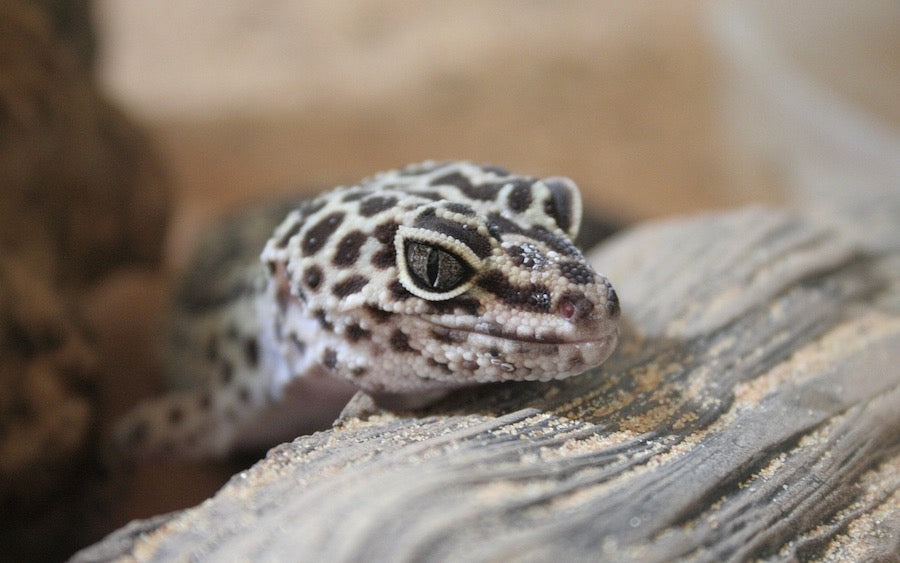If you’re like most leopard gecko owners, you’ve probably asked yourself whether or not you should feed your leopard gecko a little fruit. Maybe you’ve even tossed a slice of apple in for your little reptilian friend.
Stop!
With one (very small) exception, Leopard geckos cannot eat fruits.
Why?
Fruits are high in cellulose – a type of fiber typically found in fruits and vegetables. In order to break down cellulose, the consumer is required to have a longer and more acidic digestive tract. This is great for humans and other plant-eating animals, but it poses a problem for leopard geckos.
Originating in the naturally arid environment of the Middle Eastern deserts, leopard geckos developed shorter, more alkaline digestive tracts specifically suited for digesting insects and meat.
In short, their little tummies simply aren’t designed for digesting fruit. And, although one specific fruit won’t harm your leopard gecko – we’ll get to that – most fruits can potentially be harmful. These include:
- Strawberries
- Apples
- Watermelon
- Oranges
- Blueberries
- Lemons
- Peaches
However, you may have noticed that your leopard gecko has eaten the fruit you’ve tossed in with it. This begs the questions…
Will Leopard Geckos Eat Fruit?
The short answer is yes (but they shouldn’t). Your leopard gecko will eat fruit if offered and if left in its habitat. Geckos in general are opportunistic eaters. However, if your leopard gecko eats fruit, it’s a sign that he or she is hungry and needs to be fed a proper, more leopard gecko-friendly meal.
So grab yourself some Dubia roaches, coat them in your favorite calcium/vitamin D3 supplement (check out our Reptile Greens & Calcium Powder), and let your leopard gecko feast for 15–20 minutes.
What Fruits Can Leopard Geckos Eat?
As I mentioned earlier, there is one exception to the general rule of not feeding fruit to your leopard gecko. What is this one exception?
Bananas.
Word of caution: even though they’re not as hard on your leopard gecko’s digestion as other fruits, bananas aren’t something that you should regularly feed your pet leopard gecko. Typically bananas are prescribed by vets to be fed to sick geckos in order to keep their glucose and hydration levels up. They’re made into a sort of insect and banana “smoothie” while the sick gecko recovers.
Outside of this veterinarian prescribed remedy, it’s best to keep your reptilian friend on a strict leopard gecko-appropriate diet.

What Can a Leopard Gecko Eat?
You already know that leopard geckos are insectivores. But sometimes they like to dabble in carnivorous activities.
So, what can leopard geckos eat besides insects?
In the wild, although they remain primarily insectivores, leopard geckos will also eat scorpions, snakes, and small rodents. You can mimic this “wild” behavior by offering your leopard gecko an occasional pink mouse.
But stay alert. As soon as your leopard gecko has finished its meaty meal, you need to remove the remains from its habitat. If your gecko eats any of the bones of the pink mouse you gave it, those bones can get caught in its intestines and cause Intestinal impaction.
Are There Geckos That Eat Fruit?
There sure are!
Geckos are a diverse species that can be found in many different environments. Although most varieties of gecko are insectivores (with some carnivorous tendencies), there are a small number of omnivorous geckos:
- Crested geckos
- Gargoyle geckos
- Chahoua geckos
- Day geckos
- Mourning geckos
If you keep one of these as a pet, you can offer them various types of fruit once per week. Some of their favorites include:
- Blueberries
- Cherries
- Plums
- Grapes
- Apples
- Watermelon
- Bananas
If you choose to feed your omnivorous gecko fruits, be sure to puree the fruit first.
Takeaway: Fruits are not an appropriate food for your leopard gecko as their digestive system isn’t designed to break down the cellulose found in fruit. Stick with insects and the occasional pink mouse.
If you have questions or would like to give feedback, please email us at team@dragonsdiet.com








